- Home
- Glynnis Campbell
Knights of de Ware 02 - My Warrior Page 2
Knights of de Ware 02 - My Warrior Read online
Page 2
“Cam, lass,” he said, stuffing the cork back into the jack, “I’m far too old to be fighting battles I can’t win. Nay, don’t shake your head at me. We both know it’s true.”
She hated it when he spoke this way. He wasn’t growing old. He couldn’t grow old. He was all she had.
Laird Angus pressed his thumb into the palm of his hand, rubbing away the stiffness that had plagued him for the past several years. “I don’t intend to spend the last moments of my life engaged in war.”
She frowned. Wasn’t that what every warrior wanted? Surely these weren’t the words of the man who’d taught her to fight—sword, dagger, and fists—with her last breath, for every inch of Gavin land.
The laird continued more vehemently, but he wouldn’t meet her eyes. “I want to know my family line will continue. And I want them to live in peace.”
She only stared at him, struck dumb. Was her father becoming soft with the advancing years? Not only did he suggest betraying his mother country, but he was hinting rather broadly—again—that he expected grandchildren from Cambria. She groaned inwardly. It was a point they’d argued to death.
She was ill-suited to be any man’s wife. Everyone knew it. She was the laird’s only child, and she’d been raised by her father and Malcolm the Steward to enjoy leadership, trained to inherit the Gavin clan and its responsibilities. There had been no time for courting, even if she’d had any inclination toward it, which she didn’t, and even if anyone had shown any interest in her whatsoever, which they hadn’t.
It wasn’t that she was uncomely. She’d seen her face often enough in mirrors to know that she bore no ugly marks or scars. It was just that the men who knew her looked upon her as the future laird of the Gavin—the land and the people—a woman of power, proud and unbiddable, qualities most undesirable in a wife.
Robbie had understood her. He’d respected her strengths and her intellect, and he’d shared her fascination with politics. But even he had never regarded her with anything save brotherly affection. The truth be told, Cambria herself rarely glanced twice at a man, except to admire his prowess on the battlefield or to assess his loyalty to the clan.
Her father had brought up marriage in the past, but their altercations had always flared quickly and subsided, like pine needles on the fire. Now, as she looked into his suddenly weary eyes, she felt a queer misgiving in the pit of her stomach.
“What’s this about, Father?”
He said something foul under his breath, then jutted out his gray-whiskered chin and spoke decisively. “Tomorrow a company of English knights will come to meet with me and our men, seeking my oath of allegiance to Balliol as king of Scotland.”
She sucked in her breath. She couldn’t have been more surprised if he’d admitted to possessing two heads. It wasn’t marriage he was bullying her into after all. It was something far worse.
“Balliol?” she whispered in shock. “King Edward’s puppet?”
Angus closed his lips firmly in legendary Gavin stubbornness.
“Of course you’ll refuse,” she said, trying to convince herself that the laird hadn’t lost his wits. The twinge in her stomach told her otherwise. “Father?”
The laird wouldn’t meet her eyes.
“Father,” she bit out, trying to reason calmly with him, “you’re tired. Once you’ve slept on it, had a chance—“
“Cambria,” he chided.
Her temper snapped faster than a kindling twig. “But Balliol is not even Scots!”
“He was born in Scotland.”
She spat on the ground. “A pig born in a mews does not make it a dove.”
“Cambria,” he warned.
“Edward thinks to placate the Scots by putting that—“
“Cam.”
“That fawning runt of a—“
“Cambria!”
“What!”
“Listen to me,” he said with an uncharacteristic patience that worried her even more. “Accepting Balliol as king is our only hope to hold onto what lands we have. Now I’ve agreed to swear this oath, but only as long as the English guarantee that the Gavin property will remain in our name…mine and yours,” he added, poking her in the chest with a blunt finger. “You know what will happen to those who oppose the English…and lose.”
“The Gavins will win!”
“The Gavins couldn’t fight them even if we wished it,” Laird Angus muttered. “Our forces have been irreparably diminished because of the deserters.”
“They didn’t de-…desert us,” she retorted, stumbling over the very words she’d used herself when she found Robbie had gone. “They fight for Scotland now! You mean to desert us!”
“Don’t you understand?” The laird reddened, tensing his hands as if he fought the urge to throttle her. “If we fight the English, we’ll lose…everything—our land, our people, our way of life.”
She shook her head. The Gavins were invincible. Malcolm the Steward had said so countless times. “We won’t lose, Father,” she insisted, placing her palm square on his thick chest. “The Scots army will come to our aid.”
“Bah!” he scoffed, shaking off her hand. “They couldn’t agree on the proper way to put out a kitchen fire.”
Cambria’s ire rose at this insult. “It’s because they have no support from the likes of us. That’s the only reason they seem…”
“Inept?” her father supplied with caustic humor.
She exhaled sharply in frustration. “Father, you’re asking me to put away my sword in the midst of battle.”
“Cam, lass,” Laird Angus reasoned, “you should know the price of recklessness and poor timing. Haven’t you learned that lesson countless times from my own blade?”
His hand on her shoulder suddenly felt unbearably heavy.
“One way or another,” he continued, “England will conquer Scotland and crown whomever they wish. It’s my intent to keep as much as possible of the Gavin clan and property intact. Now is not the time for battle. The enemy’s sword is already at our throat, and the storm is upon us. Now is the time to gather what we’ll need to weather it.” He squeezed her shoulder, and then released her. “I’ve agreed to meet with one of King Edward’s knights, Lord Holden de Ware. He’s said to be a just man, one who can be trusted.”
“Trusted?” She wheeled away so he wouldn’t see the despair in her eyes. “No Englishman can be trusted,” she whispered. “Father, we’re Scots. How can you do this?”
“It’s already done, daughter,” he answered harshly, setting out for home. “Lord Holden’s men will be here tomorrow. I expect your full cooperation in making our English guests feel welcome.”
English guests? The twinge in her stomach blossomed into a full-blown ache as she followed her father in stunned silence over moss-covered stones, through leaves that might be the last to fall on Scots soil, and thought about the approaching invaders. If the English were indeed already making their way north, then it was too late. There was no choice to be made.
How had they come to this pass? In the space of a morning, her entire world had been turned upside down. Life would never be the same again. The wall she’d spent years building against the enemy shuddered dangerously with Laird Angus’s shocking pronouncement.
Cambria knew in her heart she couldn’t deny her father anything. The laird came first. That had been ingrained in her from the time she was old enough to gurgle out the words. The laird came first. And for the laird, the clan came first. There was no question about it. He was doing what he thought best for the clan.
She had to stand by him in this decision, which must have been as difficult for him to make as it was for her to accept. But, she decided, kicking a pebble from her path, she wouldn’t go down without a fight.
“I trust they won’t stay overlong,” she muttered, frowning at the spongy ground.
“Several knights will no doubt remain to secure the castle.”
She sniffed. “Our winter provisions didn’t take into account extra guest
s.”
“Then it’s just as well the deserters have so kindly left their portions behind,” he countered dryly.
“Well,” she said, flicking a beetle from her cloak, “I won’t kneel to this…de Warren. I don’t care if he is a lord.”
“De Ware,” he corrected. “Lord Holden de Ware.”
“Hmph.”
“The de Wares are renowned for their swordsmanship and ferocity. Some call Lord Holden the Wolf. It’s said he’s never known defeat in battle.”
She bristled at this piece of nonsense. The man had obviously never fought a Scotsman.
They stopped on the grassy mound before Castle Blackhaugh, the ancient seat of the Gavin clan, and stood for a moment, looking up in reverence at the worn blue-gray stones.
“I’ll put the matter before the clan in the hall tonight,” the laird said. “It would ease the way had I your support.”
She stiffened.
“I know it’s a difficult thing I ask of you,” he said, “but please, daughter, for the sake of the Gavin, for the sake of your dear departed mother, and for an old man’s dreams, make no trouble for this English lord. He’ll be our only defender, and I’ve faith he’ll defend us well.”
She couldn’t help but wonder who would defend them against him, but she swallowed her pride and the urge to rail against the powerlessness that gripped her.
“I suppose I should go prepare for our English…guests,” she bit out.
Laird Angus kissed her on the forehead. Then she turned and marched toward the gates of Blackhaugh.
Katie, the steward’s wife, entered the kitchen and gasped at the chaos before her.
Like the first light snow of winter, fine white flour dusted everything—the flagstone floor, the iron pot swinging perilously on its hook over the fire, even the quivering black beard of the enraged cook. Broken bits of crockery littered the tables, and an ugly brown substance oozed down one wall where it had splattered.
Through the midst of the maelstrom paced Cambria Gavin, sending up tiny clouds of flour as she barked out demands to the cowering scullion lads, her stormy eyes flashing in an ill temper. While Katie watched with raised brows, Cambria cornered the Hamish the cook, haranguing the man with impossible requests. When Hamish’s hand began to tighten around the handle of the enormous knife he held, Katie decided it was time to step in. She took her charge’s elbow and tugged her out of range.
“Come, lass,” she soothed, clucking her tongue. “The kitchen’s no place for a battle. It’s as hot as Hades in here.” She lifted the corner of her apron and dabbed at the dusting of flour across Cambria’s nose.
Katie supposed she was as near a mother to Cambria as anyone. She knew the lass’s quicksilver moods and the volatile temper that could be the dread of many a servant. But she’d also seen the girl cry when she thought no one was watching, sobbing soundlessly into her sleeve as if her heart would break.
“What does he mean, he can’t make more cheese for tomorrow?” Cambria demanded, scowling at the cook.
“Lass,” Katie explained gently, steering her away from the red-faced man, “cheese must be aged.”
“Will it be ready the following day?”
“Nay, lass.”
“How old must it be?” Cambria ground out.
“It won’t be ready till winter, my lady.” She chuckled.
Katie wondered at times what Cambria would do without her. For all her ability to read and write, to wield sword and longbow, the lass was useless when it came to household affairs. Cambria had once told her that preparing the household for guests was more painful than taking a lance blow to the stomach.
If the present state of the castle were proof, Katie could believe it. More than a dozen pallets had had to be tossed out, having become a haven for rats and fleas, and they lay like dead cattle in the courtyard. Chambers unused for weeks had proved a nightmare of cobwebs. Fresh rushes had been mistakenly spread atop the old in the great hall, and so all had to be swept out. Cambria had completely tangled the needlework crest she’d meant to repair on her father’s finest tabard and, in a fit of anger, had run her dagger through the cloth. Consequently, the poor white hawk of the Gavin appeared to have been mortally wounded. Already this morning the cook looked ready to spit and roast his young mistress.
Katie sighed. She’d be up half the night repairing the fruits of Cambria’s labor. And now the lass was glaring coldly at her, as if she were to blame for the physical properties of cheese.
Her look was wasted. Katie never let Cambria’s nasty temper bother her. The lass’s rages usually blew over quicker than an April storm.
Tucking Cambria into a relatively safe corner of the kitchen, she bubbled merrily about, shooing some of the grateful scullery lads out.
“My lady,” she sang, dipping a huge wooden spoon into a pot of thick stock, “there’s no shortage of good food. We’ve fowl and hare aplenty and even fresh trout today.”
“I see no reason to deplete our stores of meat for visitors when pottage and cheese will do,” Cambria snapped.
Katie laughed and blew on the spoonful of broth. “Why, lass, what grudge do you hold against our visitors? Your father wishes to show them every courtesy. Pottage and cheese indeed!” She ignored Cambria’s scowl and sipped at the spoon.
“Mmm, you’ve outdone yourself, Hamish,” she crooned.
The cook grunted, pacified for the moment.
Katie glanced at Cambria. The poor girl’s fingers were worrying her surcoat to rags. She’d never seen her quite so distraught.
All at once, the reason thumped her on the head like an iron pot. “You know, your father has been quite mysterious about these visitors,” she confided. “Is it possible he’s arranged a match for you?”
All the color drained from Cambria’s face. Horror shadowed her eyes. “Not that,” she choked out. “Never that.”
Then Cambria fled, leaving behind the relieved cook, a handful of bewildered kitchen-boys, and one foolish steward’s wife who wrung her hands, wishing she could take back her careless words.
Cambria pulled at the neck of her dark madder surcoat. The heavy wool was stifling in the crowded great hall. The greasy smell of the mutton stew congealing in its doughy trencher turned her stomach, so she only picked at it. The familiar sounds and smells of supper had taken on a sharper cast somehow, making her strangely sensitive to every taste, every word, almost as if it were her last meal.
Her father spoke quietly with Malcolm about the size of the brook trout. Two ladies further down the table discussed remedies for aches of the head. The chatter at the lower tables was raucous and indiscernible. Hounds growled at her father’s feet as he tossed them bones to gnaw on. The pungent smells of robust ale, onions, peppery mutton, and mustard assailed her nostrils.
Today, Cambria felt the hardness of the worn oak bench beneath her cushion, smelled the delicate meadowsweet strewn among the rushes, heard every smack of lips, every swallow of ale. Her nerves stretched taut in anticipation. Each dagger that clattered on the table made her flinch. As she perused the walls along the length of the hall, where the faded shields of the conquered were hung, she wondered how many enemies her father was about to make and whether she had the strength to lend him convincing support.
Finally, rising and banging on his pewter cup with the haft of his knife, the laird commanded everyone’s attention.
“We are all Gavins,” he began, his voice as strong and comforting as honey mead on a winter night, “those of you sprung from the loins of the clan and those of you who’ve chosen to abide within these walls, under the clan’s protection. There is nothing—“he banged his fist on the table for emphasis, and Cambria’s heart leaped into her throat—“nothing more important than the survival of the clan and its claim to this land.”
A few isolated cheers arose at his words, but most waited breathlessly for the crux of his speech.
“I’m a man of little politic. I freely admit I care not who is by rights the king,
only that he who rules is just and fair.”
“And distant!” someone cried out.
Chuckles circled the room. The laird smiled. Then he held up his hand for quiet.
“War is imminent between Scotland and England. Those of us in the Borders must choose who we will support.” He cleared his throat and stroked his grizzled chin. “A fortnight ago we lost many fine lads to a battle cry their foolish hearts could not resist. They chose their lot. I bear them no ill will.”
Cambria knew otherwise, but was silent.
“I have chosen as well,” he continued, resting his fingertips on the table before him. “I have done so not from the leanings of my heart, but from the dictates of my head.” He paused a long while, studying the faces of every clan member. “I’ve chosen to ally with the English and Balliol.”
A collective gasp filled the hall, and a low rumbling of exchanges began, which seemed to Cambria like the thunder before a summer storm. The laird needed her now. Glancing nervously about, she rose on quaking legs, acknowledging her father with a formal nod.
“Good folk,” she began tentatively.
No one heard her.
“Good folk!” she bellowed, the sound this time like a chapel bell ringing in a garderobe. The murmuring ceased instantly. Cambria folded her hands before her and tried not to fidget. “Like most of you, I do not wish to see Balliol take the throne.”
Several people nodded in agreement, and she continued in a surer tone. “But neither do I wish to see our clan destroyed and our land divided. The English…will win,” she bit out painfully. “They have greater strength and number, and they have unity, which the Scots do not. Because of the…deserters, our own forces have been diminished. We do not have the option of resistance. They are already upon us, and there is no Scots army to deliver us from siege.”
The voices rose again, some contemplative, some indignant.
“Our only hope,” the laird added, his eyes glowing with pride as he glanced at Cambria, “is to ally with the English. But on our terms. I’ve agreed to the alliance only on the contingency that our holdings remain in the name of the Gavin.” He paused and winked at Cambria. “And they’ve accepted my demand. They wish only to use our fortress and our knights. When they’ve quelled the rebellion, they will go home.” He added with a grin, “They will have to go home. Their lily-white English skin could not endure our winter.”

 Bride of Fire
Bride of Fire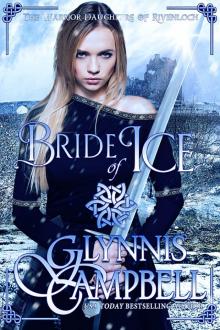 Bride of Ice
Bride of Ice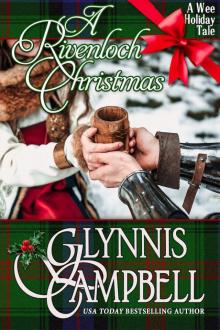 A Rivenloch Christmas
A Rivenloch Christmas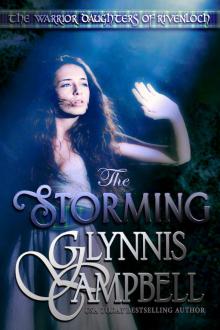 The Storming
The Storming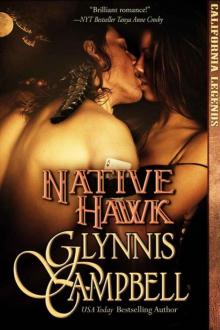 Native Hawk (California Legends Book 3)
Native Hawk (California Legends Book 3)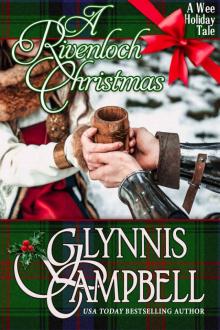 A Rivenloch Christmas: A Wee Holiday Tale (The Warrior Daughters of Rivenloch Book 0)
A Rivenloch Christmas: A Wee Holiday Tale (The Warrior Daughters of Rivenloch Book 0)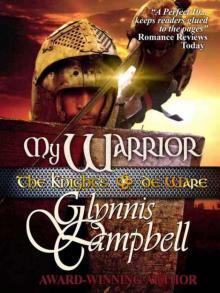 Knights of de Ware 02 - My Warrior
Knights of de Ware 02 - My Warrior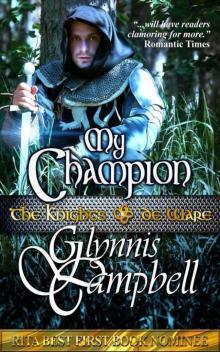 Knights of de Ware 01 - My Champion
Knights of de Ware 01 - My Champion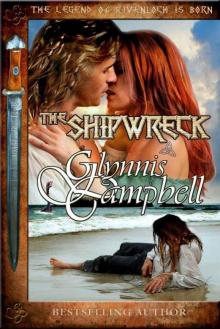 The Shipwreck
The Shipwreck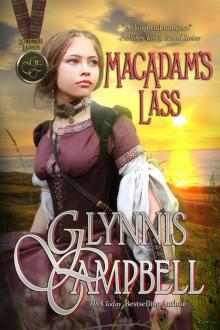 MacAdam's Lass
MacAdam's Lass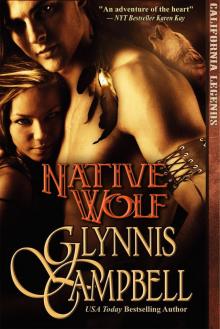 Native Wolf
Native Wolf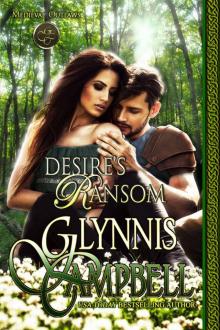 Desire's Ransom
Desire's Ransom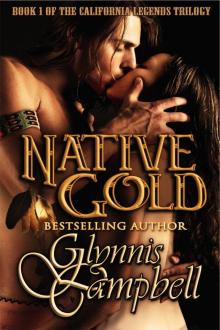 Native Gold
Native Gold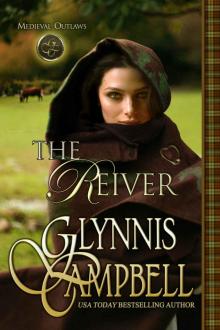 The Reiver
The Reiver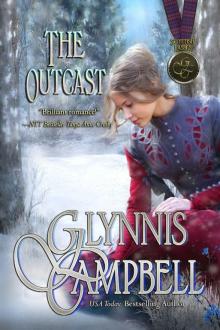 The Outcast
The Outcast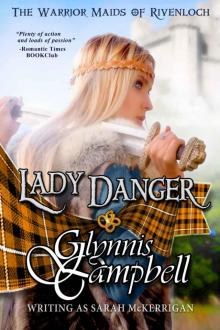 Lady Danger (The Warrior Maids of Rivenloch, Book 1)
Lady Danger (The Warrior Maids of Rivenloch, Book 1)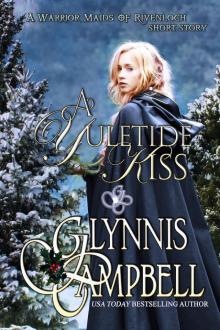 A Yuletide Kiss
A Yuletide Kiss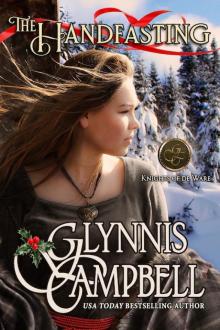 The Handfasting
The Handfasting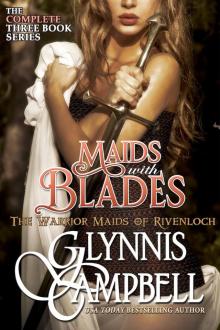 Maids with Blades
Maids with Blades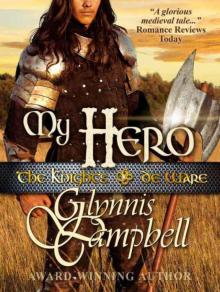 Knights of de Ware 03 - My Hero
Knights of de Ware 03 - My Hero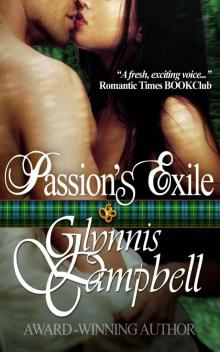 Passion's Exile
Passion's Exile Danger's Kiss
Danger's Kiss Highlanders for the Holidays: 4 Hot Scots
Highlanders for the Holidays: 4 Hot Scots